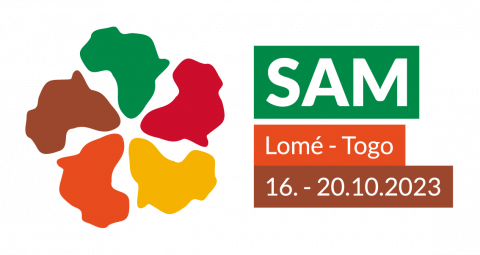 A seat next to Kwashie Agbitor (pictured below) was one of the most highly sought-after spots at SAM 2023 in Togo in October. Mr Agbitor has 20 years of experience in Africa and Asia, improving branch operations, credit appraisals, risk management, methodology auditing, product development, client protection and social performance management.
A seat next to Kwashie Agbitor (pictured below) was one of the most highly sought-after spots at SAM 2023 in Togo in October. Mr Agbitor has 20 years of experience in Africa and Asia, improving branch operations, credit appraisals, risk management, methodology auditing, product development, client protection and social performance management.
At SAM 2023, Mr Agbitor moderated a discussion titled “Climate funds, an opportunity for financial institutions to scale up sustainable and inclusive financing.” The panelists represented the Tunisian microfinance institution (MFI) Enda Tamweel, the Belgian impact investment firm Incofin, the Kenyan microlender Juhudi Kilimo and the French impact investor Solidarité Internationale pour le Développement et l’Investissement (SIDI).
Bob Summers: How can financial services providers (FSPs) work with climate funds to expand their green lending portfolios?
 Kwashie Agbitor: There are numerous opportunities for financial institutions to build their green portfolios with climate funds. Financial institutions can leverage equity, debt and quasi-equity sources of funding from various types of organizations. Climate funds can be used to develop and deploy financial services that support the adoption of green products/solutions and help people recover from climate-related shocks. Given their nature, most climate funders also provide technical support/assistance in addition to funding.
Kwashie Agbitor: There are numerous opportunities for financial institutions to build their green portfolios with climate funds. Financial institutions can leverage equity, debt and quasi-equity sources of funding from various types of organizations. Climate funds can be used to develop and deploy financial services that support the adoption of green products/solutions and help people recover from climate-related shocks. Given their nature, most climate funders also provide technical support/assistance in addition to funding.
BS: What factors influence whether a climate fund would invest in a particular MFI?
KA: Firstly, the MFI and the investor must

 The Just Sustainability Transitions (JuST) Institute, an NGO based in France, recently launched with the mission of supporting financial services providers (FSPs), consultants and both public and private investors in expanding their work “for the benefit of people and the planet.” In particular, the JuST Institute seeks to facilitate investment flows and capacity building services that support farmers and small-business owners in climate adaptation and conserving biodiversity. The NGO’s initial focus is on
The Just Sustainability Transitions (JuST) Institute, an NGO based in France, recently launched with the mission of supporting financial services providers (FSPs), consultants and both public and private investors in expanding their work “for the benefit of people and the planet.” In particular, the JuST Institute seeks to facilitate investment flows and capacity building services that support farmers and small-business owners in climate adaptation and conserving biodiversity. The NGO’s initial focus is on During the opening day of
During the opening day of